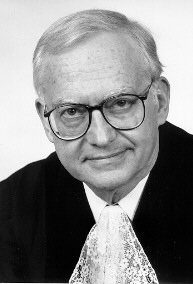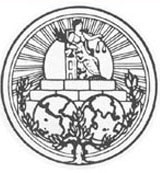United Nations Security Council Resolution 99, adopted on August 12, 1953, noting that Judge Sergei Golunsky had submitted his resignation due to his ill health and that a vacancy would exists in the International Court of Justice the Council decided an election to fill the vacancy should take place during the eighth session of the General Assembly.
United Nations Security Council Resolution 105, adopted on July 28, 1954, after noting with regret the death of Judge Sir Benegal Narsing Rau, a Judge on the International Court of Justice, the Council decided that the election to fill the vacancy would take place during the ninth session of the General Assembly, and that that election would take place after the regular election to be held at the same session to fill the five vacancies which would come up on February 5, 1955.
United Nations Security Council Resolution 117, adopted on September 6, 1956, after the death of Judge Hsu Mo of the International Court of Justice the Council decided that the election to fill the vacancy for the rest of Judge Mo's term would take place during the eleventh session of the General Assembly.
United Nations Security Council Resolution 130, adopted on November 25, 1958, noted with regret the death of Judge José Gustavo Guerrero on October 25, 1958. The Council then decided that in accordance with the Statute of the Court the resulting vacancy in the International Court of Justice would be resolved by an election in the General Assembly that would take place during the fourteenth session of that body.
United Nations Security Council Resolution 137, adopted on May 31, 1960, noted with regret the death of Judge Sir Hersch Lauterpacht on May 8. The Council then decided that in accordance with the Statute of the Court the resulting vacancy in the International Court of Justice would be resolved by an election in the General Assembly that would take place during the fifteenth session of that body.
United Nations Security Council Resolution 208, adopted on August 10, 1965, after noting with regret the death of Judge Abdel Hamid Badawi, a judge on the International Court of Justice, the Council decided that the election to fill the vacancy would take place during the twentieth session of the General Assembly.

United Nations Security Council Resolution 499, adopted unanimously on December 21, 1981, after noting the death of International Court of Justice (ICJ) judge Abdullah El-Erain, the Council decided that elections to the vacancy on the ICJ would take place at the Security Council and at the General Assembly's thirty-sixth session.

United Nations Security Council resolution 595, adopted unanimously on 27 March 1987, after noting the death of International Court of Justice (ICJ) judge and Vice President Guy Ladreit de Laucharrière on 10 March, the Council decided that elections to the vacancy on the ICJ would take place on 14 September 1987 at the Security Council and at the General Assembly's 41st session.

United Nations Security Council resolution 627, adopted unanimously on 9 January 1989, after noting the death of International Court of Justice (ICJ) President Nagendra Singh on 11 December 1988, the council decided that elections to the vacancy on the ICJ would take place on 18 April 1989 at the Security Council and at the General Assembly's 43rd session.

United Nations Security Council resolution 708, adopted unanimously on 28 August 1991, after noting the death of International Court of Justice (ICJ) President Taslim Olawale Elias on 14 August 1991, the council decided that elections to the vacancy on the ICJ would take place on 5 December 1991 at the Security Council and at the General Assembly's 46th session.

United Nations Security Council resolution 805, adopted unanimously on 4 February 1993, after noting the death of International Court of Justice (ICJ) judge Manfred Lachs on 14 January 1993, the Council decided that elections to the vacancy on the ICJ would take place on 10 May 1993 at the Security Council and at a meeting of the General Assembly during its 47th session.
United Nations Security Council Resolution 1914, adopted unanimously on 18 March 2010, after noting the resignation of International Court of Justice (ICJ) judge Shi Jiuyong and that the vacancy must be filled in accordance with the Statute of the ICJ, the Council decided that the election to fill the vacancy would take place on 29 June 2010 at a meeting of the Security Council and at a meeting of the General Assembly at its 64th session.

United Nations Security Council resolution 951, adopted without a vote on 21 October 1994, after noting the death of International Court of Justice (ICJ) judge Nikolai Konstantinovitch Tarassov on 28 September 1994, the Council decided that elections to the vacancy on the ICJ would take place on 26 January 1995 at the Security Council and at a meeting of the General Assembly during its 49th session.

United Nations Security Council resolution 979, adopted without a vote on 9 March 1995, after noting the death of International Court of Justice (ICJ) judge Roberto Ago on 24 February 1995, the Council decided that elections to the vacancy on the ICJ would take place on 21 June 1995 at the Security Council and at a meeting of the General Assembly during its 49th session.

United Nations Security Council resolution 980, adopted without a vote on 22 March 1995, after noting the resignation of International Court of Justice (ICJ) judge Sir Robert Yewdall Jennings which would take effect on 10 July 1995, the Council decided that elections to the vacancy on the ICJ would take place on 12 July 1995 at the Security Council and at a meeting of the General Assembly during its 49th session.

United Nations Security Council resolution 1018, adopted unanimously on 7 November 1995, after noting the death of International Court of Justice (ICJ) judge Andrés Aguilar-Mawdsley on 24 October 1995, the Council decided that elections to the vacancy on the ICJ would take place on 28 February 1996 at the Security Council and at a meeting of the General Assembly during its 50th session.

United Nations Security Council resolution 1278, adopted without a vote on 30 November 1999, after noting the resignation of International Court of Justice (ICJ) judge Stephen M. Schwebel taking effect on 29 February 2000, the Council decided that elections to the vacancy on the ICJ would take place on 2 March 2000 at the Security Council and at a meeting of the General Assembly during its 54th session.

United Nations Security Council Resolution 1926, adopted unanimously on June 2, 2010, after noting the resignation of International Court of Justice (ICJ) judge Thomas Buergenthal with effect from September 6, 2010. The Council decided that the election to fill the vacancy would take place on September 9, 2010 at a meeting of the Security Council and at a meeting of the General Assembly.

United Nations Security Council resolution 1361, adopted without a vote on 5 July 2001, after noting the resignation of International Court of Justice (ICJ) judge Mohammed Bedjaoui taking effect on 30 September 2001, the Council decided that elections to the vacancy on the ICJ would take place on 12 October 2001 at the Security Council and at a meeting of the General Assembly during its 56th session.

United Nations Security Council resolution 1571, adopted without a vote on 4 November 2004, after noting the resignation of International Court of Justice (ICJ) judge Gilbert Guillaume taking effect on 11 February 2005, the Council decided that elections to the vacancy on the ICJ would take place on 15 February 2005 at the Security Council and at a meeting of the General Assembly during its 59th session.









